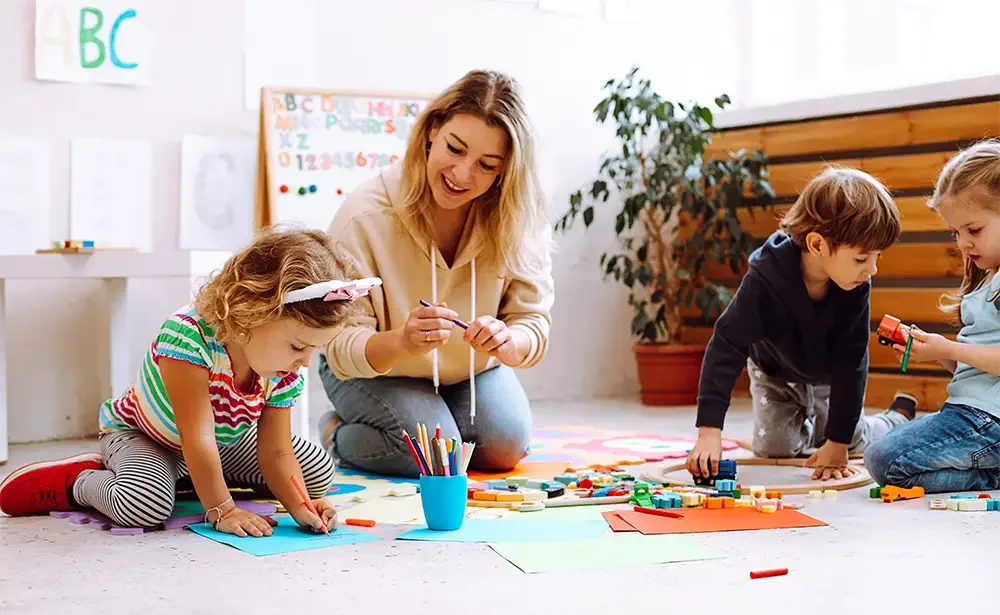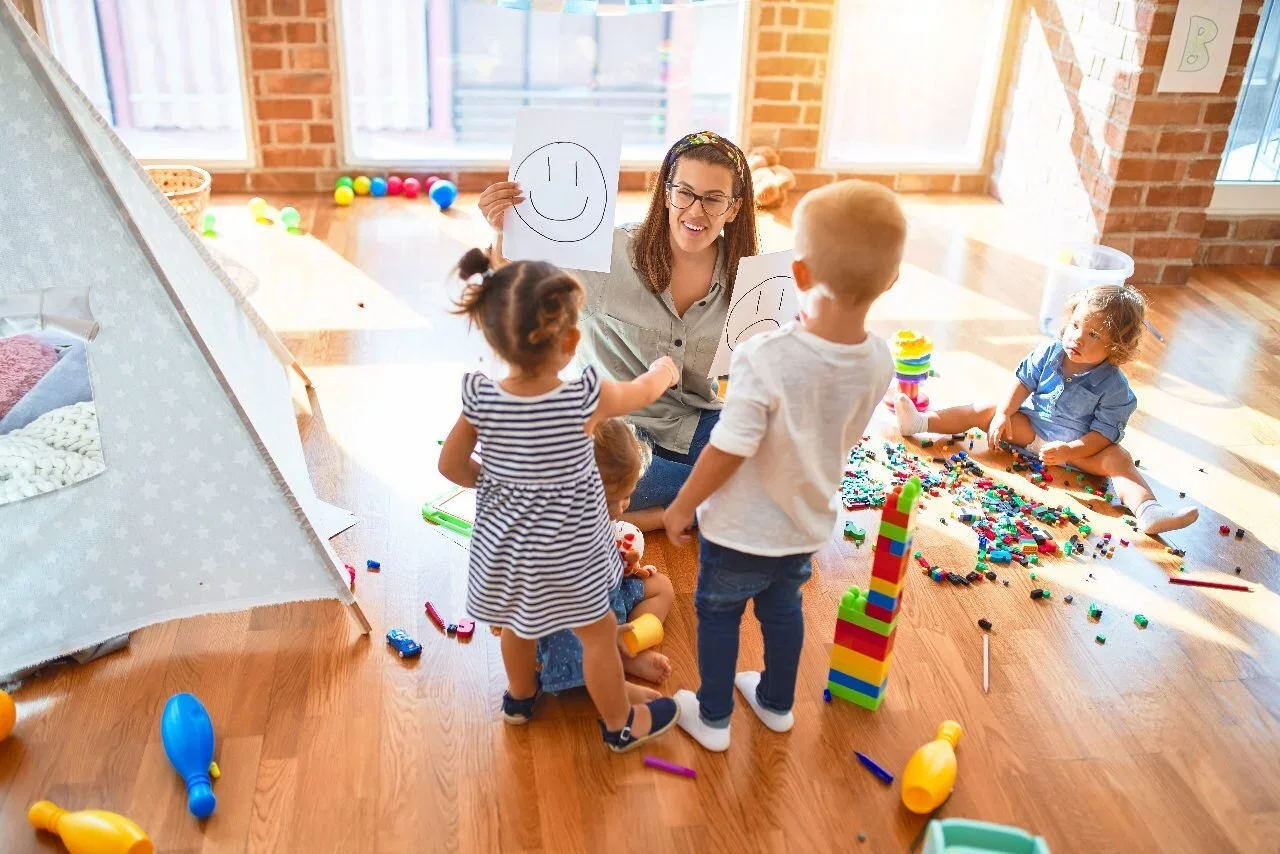Play Therapy
What is Play Therapy?
Play Therapy is much more than just playing; it's a structured and evidence-based therapeutic approach specifically designed for children, typically ages 3-12. Conducted by therapists with specialized training in child development and play therapy techniques, it uses carefully selected toys and creative materials within a safe therapeutic space (the playroom) to help children express thoughts and feelings they may not be able to verbalize. It allows therapists to understand a child's inner world and help them resolve psychosocial difficulties.
Play is the natural language of children – it's how they explore the world, express complex feelings, and make sense of their experiences. At Touch Brain Counselor in Coquitlam & Vancouver, we offer specialized Play Therapy services, providing a safe and understanding environment where children can communicate, heal, and develop essential coping skills. Our trained therapists utilize the power of play to support children across the Tri-Cities facing emotional, social, or behavioural challenges.
Play Therapy Coquitlam
Helping Children Heal & Grow Through Play
Understanding A Child's Natural Language
Why Play Therapy?
Adults often process experiences through talking, but for children, play serves this vital function. Toys become their words, and play becomes their language. Through play, children can act out confusing or scary situations, explore different roles and solutions, express wishes and fears, and release pent-up emotions in a way that feels natural and non-threatening. Play therapy taps into this innate ability, providing a pathway for healing and growth.
Addressing Childhood Challenges Through Play
Play Therapy can effectively help children navigate:
Anxiety: Including separation anxiety, social worries, specific phobias, and general nervousness.
Trauma & Loss: Processing difficult events like accidents, bereavement, family violence, or abuse in a safe, symbolic way.
Emotional Regulation: Learning to identify, understand, and manage big feelings like anger, sadness, and frustration.
Social Skills Development: Practicing sharing, turn-taking, empathy, and navigating peer interactions.
Behavioural Issues: Addressing aggression, defiance, withdrawal, impulsivity, or significant changes in behaviour.
Family Changes: Coping with divorce, separation, relocation, illness in the family, or the arrival of a new sibling.
Self-Esteem Issues: Building confidence and a stronger sense of self-worth.
ADHD-Related Challenges: Improving impulse control, focus (within play), and social understanding.
Attachment Difficulties: Strengthening secure attachment patterns.
What Happens in a Play Therapy Session?
The Playroom: A Space for Expression
Our playroom is thoughtfully equipped with a range of specific toys and materials chosen for their therapeutic value. This might include dolls and puppets, art supplies, building blocks, sand trays with miniatures, dress-up clothes, and more, allowing children diverse ways to express themselves.
Who Can Benefit from Play Therapy?
Play Therapy is typically most effective for children aged approximately 3 to 12 years old. It is particularly beneficial for children who:
Have experienced stressful or traumatic events.
They are struggling with anxiety, sadness, or anger that they can't easily talk about.
They are exhibiting challenging behaviours at home or school.
Have difficulties with social interactions.
We are going through significant life changes.
Child-Led and Integrated Approaches
Often, Play Therapy is child-led, meaning the child chooses the toys and activities, guiding the session's focus based on their internal needs. At times, the therapist might use more directive techniques or integrate elements from other approaches like Art Therapy or introduce concepts from Cognitive Behavioral Therapy (CBT) through playful activities, depending on the child's specific goals and therapeutic needs.
k
Individual Play Therapy
At Touch Brain Counselor, our Individual Play Therapy sessions offer children a safe, nurturing space to explore their thoughts, emotions, and experiences through the natural language of play. Designed to meet each child’s unique needs, these sessions help children process feelings, develop coping skills, and build confidence in a supportive one-on-one setting.
How Individual Play Therapy Helps:
Emotional Expression: Children can communicate feelings that may be difficult to put into words.
Behavioral Support: Helps children with ADHD, autism, or other challenges develop self-control, focus, and positive coping strategies.
Social Skills Development: Builds interpersonal skills, empathy, and problem-solving abilities.
Trauma Processing: Provides a safe space to explore and work through past experiences at a comfortable pace.
Our trained therapists at Touch Brain Counselor tailor each session to the child’s individual needs, ensuring a compassionate, personalized approach that fosters growth, resilience, and emotional well-being.
Group Play Therapy
At Touch Brain Counselor, our Group Play Therapy sessions provide children with a safe, supportive environment to connect, share, and grow together. These sessions allow children to explore emotions, develop social skills, and practice coping strategies while interacting with peers in a guided, therapeutic setting.
Benefits of Group Play Therapy:
Social Skills Development: Children learn to communicate, cooperate, and resolve conflicts in a positive environment.
Emotional Expression: Group activities encourage children to share feelings, recognize emotions in others, and build empathy.
Confidence and Self-Esteem: Participating in group play helps children feel valued, supported, and understood.
Support for Behavioral Challenges: Children with ADHD, autism, or other developmental differences can practice positive behaviors and coping strategies in real-world social scenarios.
Fun and Engaging Healing: Therapeutic games and creative activities make learning life skills enjoyable and effective.
Guided by our trained therapists, Group Play Therapy at Touch Brain Counselor combines the healing power of play with peer interaction to help children build resilience, self-awareness, and emotional well-being—together.
Combination Therapy (Individual & Group)
At Touch Brain Counselor, we offer a comprehensive combination therapy approach that integrates Play Therapy, Art Therapy, and Neurofeedback. By blending these powerful modalities, we address emotional, behavioral, and neurological challenges from multiple angles—helping children and adults achieve meaningful growth and well-being.
Benefits of Combination Therapy:
Enhanced Emotional Expression: Play and art provide safe, creative ways for clients to communicate feelings, while neurofeedback supports emotional regulation.
Improved Focus and Attention: Neurofeedback trains the brain for better concentration, complementing behavioral and social skills learned through play and group interactions.
Stronger Coping Skills: Individual sessions allow personalized attention, while group therapy fosters social learning, empathy, and teamwork.
Trauma and Anxiety Support: Clients can process difficult experiences through creative and guided activities while developing neural resilience through neurofeedback.
Behavioral and Cognitive Development: This integrated approach supports self-control, problem-solving, and adaptive behaviors in both structured and social environments.
Holistic Growth: By addressing emotional, cognitive, and social needs together, clients build confidence, resilience, and a greater sense of well-being.
Individual and Group Options:
Individual Sessions: Tailored to a child’s or adult’s unique needs, ensuring focused, personalized support.
Group Sessions: Encourage peer interaction, social skill development, and shared learning in a guided, therapeutic environment.
At Touch Brain Counselor, our combination therapy empowers clients to thrive—creatively, emotionally, and neurologically—through an integrated, supportive, and holistic approach.
Why Choose Touch Brain Counselor?
At Touch Brain Counselor, we believe that healing and self-expression go hand in hand. Our Art Therapy program provides a safe, supportive space where children and adults can explore their emotions, reduce stress, and foster personal growth through creative expression.
Using art as a therapeutic tool, our trained counselors help clients process feelings that may be difficult to express with words alone. Whether coping with anxiety, trauma, ADHD, autism, or other mental health challenges, art therapy empowers individuals to discover new insights, build resilience, and experience the healing power of creativity.
At Touch Brain Counselor, we’re not just helping you create art—we’re helping you create a path to emotional well-being.
What Sets Us Apart:
Personalized Care: Every child or adult receives a treatment plan tailored to their unique needs, challenges, and goals.
Experienced Professionals: Our team of licensed therapists and specialists brings years of expertise in child development, trauma, ADHD, autism, and related disorders.
Holistic Approach: By integrating creative, behavioural, and neurological therapies, we address the whole person—mind, body, and emotions.
Safe and Supportive Environment: We provide a welcoming space where clients feel heard, understood, and empowered to grow.
Proven Results: Our combination of therapies has helped countless clients improve emotional regulation, social skills, focus, and overall well-being.
At Touch Brain Counselor, we don’t just treat symptoms—we guide children and adults toward resilience, confidence, and lasting mental wellness.








